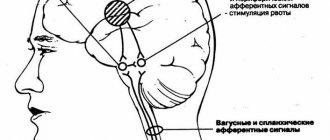The menstrual cycle plays an important role in women's health and is responsible for the normal functioning of the reproductive system. Therefore, everything that happens in the phase requires observation and control. Vaginal discharge throughout the entire cycle is normal; it protects the genitals from infection. An increase in their volume can be noticed immediately before the onset of menstruation. Here it is important to pay attention to such criteria as density, color, smell, abundance and other features. These indicators can indicate both a healthy course of the menstrual cycle and various abnormalities and diseases.
On what day do the first signs appear?
For conception to occur, a combination of certain factors is necessary:
- ovulation must occur;
- the presence of viable sperm in the fallopian tubes;
- absence of gynecological pathologies and hormonal abnormalities in women.
When does ovulation occur? In women with an average menstrual cycle of 28–30 days, the egg is released and the follicle is released in the middle of the cycle – 12–16 days after the start of menstruation. If at this moment she meets a sperm, then the probability of conception is approximately 35–40%.
The main ghost of ovulation is copious white discharge that stretches well and looks like a raw egg block. Other symptoms - soreness and sensitivity of the mammary glands, nipples, pulling sensations in the lower abdomen, headache, increased libido - appear in women with varying degrees of intensity, or may be completely absent.
If the intervals between critical days differ from the statistical average, then to find out the day of ovulation, you need to subtract 14 from the number of days in the cycle. With irregular periods, it is difficult to calculate the date of release of the egg; you need to use special tests.
But pregnancy after fertilization does not occur immediately; after the fusion of the female and male cells, the division of the egg begins, while it actively moves through the tubes into the uterine cavity. This process takes on average 10–12 days, during which time the endometrium becomes loose and progesterone begins to be actively produced - these conditions are necessary for normal childbearing.
Table “On what day of the cycle may signs of pregnancy appear”
| Cycle length (days) | Approximate date of ovulation (cycle day) | When signs of pregnancy may appear (day of cycle) |
| 21 | 5–9 | 15–19 |
| 24–25 | 10–11 | 20–22 |
| 26–30 | 12–16 | 22–27 |
| 31–32 | 14–18 | 24–29 |
| 33–35 | 19–21 | 29–32 |
| 36–38 | 22–24 | 32–35 |
| 38–40 | 24–26 | 34–36 |
Important! After leaving the follicle, the egg lives no more than 48 hours, but sperm under favorable conditions can remain active in the fallopian tubes for 3–7 days. Therefore, not only the day of ovulation, but also the 5 days before and after are considered favorable for conception.
Premenstrual syndrome - mental symptoms
It is difficult to list all the symptoms of PMS - there can be more than 300 of them. At the same time, the mental symptoms of premenstrual tension are just as annoying and unpleasant as the physical ones. In each subsequent cycle they can occur in different intensities and in different combinations.
It is believed that the cause of their occurrence is gestagens that disrupt the functioning of the nervous system. Symptoms are usually not limited to the fact that a woman is in a bad mood before her period. Characteristic symptoms of PMS from a range of mental disorders:
- nervousness, irritability, tearfulness;
- hyperactivity;
- anxiety;
- low self-esteem;
- fatigue, insomnia;
- problems with concentration;
- lack of motivation to act;
- aggression, anger.
Mood swings during PMS are a problem for a woman and those around her. These symptoms are accompanied by more serious problems: low mood, depression, which provoke bouts of crying. There may be a decrease in libido and deterioration in sex life during PMS.
If you feel so bad before your period that it interferes with normal functioning, you may have premenstrual dysphoric disorder (PMDD).
Early signs of pregnancy
After the egg is fixed in the uterus, radical changes begin to occur in the body, albeit still imperceptible, outwardly imperceptible. But in some women, symptoms of pregnancy appear already in the first days after conception, but often these signs are in many ways similar to the manifestation of PMS. Against the background of changes in the hormonal background, the emotional background changes - irritability, tearfulness, and sudden mood swings appear.
What sensations are observed at the beginning of pregnancy:
- Yellow or bloody discharge, pulling in the lower abdomen
- occurs 10-12 days after ovulation, when the egg is fixed in the uterus. Normally, after a maximum of 2 days, this symptom should disappear. - Cramps at night
- during pregnancy, most of the calcium is spent on building the child’s bone tissue; the lack of this element causes discomfort in the limbs. - Decreased blood pressure
- after conception, radical changes occur in a woman’s circulatory system, an additional circle is formed to nourish the placenta, all this provokes the development of hypotension. Pathology can appear already in the first week, manifesting itself in the form of dizziness, weakness, nausea, swelling of the face; high levels of progesterone can also provoke the development of hypotension. - Drowsiness, increased fatigue
- the body spends a lot of energy maintaining the life and development of the fetus, so the woman constantly feels tired. - Swelling of the mammary glands
- this is how the body prepares for breastfeeding; the breasts hurt during almost the entire pregnancy. - Tingling in the uterus, frequent urination, discomfort in a sitting position, nagging pain in the lower back
- occurs against the background of increased blood circulation in the pelvic organs, changes in kidney function. - Toxicosis
- the body perceives the fetus as a foreign body, nausea and vomiting appear, and sometimes there is an increase in body temperature to subfebrile levels.
Some disorders of the digestive system - constipation, bloating, lack of appetite, or an increase in appetite - may also indicate pregnancy. This is due to the fact that from the first days after conception the intestines begin to work more slowly. Diarrhea may also occur as the body's reaction to stress.
Often pregnant women complain of severe itching - the skin itches due to high estrogen content and increased load on the liver. But such a sign may indicate the presence of serious illnesses; it is necessary to consult a doctor.
One of the most reliable first signs of pregnancy is basal temperature. If a woman regularly plots a graph, then upon conception, you will notice that after ovulation the values do not decrease, but remain at a level of 37.1 degrees or more. You can see what the basal values curve looks like in the photo.
Causes of PMS - symptoms before menstruation
The causes of premenstrual syndrome are not fully understood. Scientists mainly name hormonal reasons. A new assumption is that progesterone metabolites acting on the central nervous system are responsible for the occurrence of premenstrual syndrome.
It is also postulated that progestogen deficiency with excess estrogen and the associated accumulation of water in the extracellular space may influence the development of symptoms before menstruation. Characterized by a sudden disappearance of PMS symptoms with the onset of menstruation.
PMS is mainly observed in women over 30 years of age. It is also the most severe and annoying condition before menopause. After menopause, the symptoms of premenstrual syndrome completely disappear. If they persist, this means that they are caused by another physical or mental illness, which requires careful evaluation and diagnosis by a gynecologist.
How to determine pregnancy before missed period?
In addition to sensations and external changes, you can find out about pregnancy before a missed period using special tests or traditional methods.
How can you determine pregnancy:
- HCG analysis
- after conception, the placenta begins to secrete a specific hormone, the levels of which increase throughout pregnancy. The test can be done 10 days after ovulation; it must be taken in the morning on an empty stomach. - Ultrasound
is one of the most accurate methods for determining pregnancy, but a good specialist will be able to see the presence of an egg only 5-7 days after the delay. - Pregnancy test
- a small amount of hCG is also present in the urine, which allows you to determine conception using simple tests yourself. For analysis, it is better to use a morning urine sample, choose tests with a sensitivity of 10 mIU/ml; a weak second line may appear 7–9 days after ovulation. - Iodine
- wet a napkin in a portion of morning urine, drop some silent iodine, during pregnancy the spot will acquire a rich purple color. You can drop iodine directly into a container with urine; if the drop does not sink, the test can be considered positive. - Soda
- add 3-5 g of soda to a bowl with morning urine; during pregnancy, the powder settles to the bottom; if conception does not occur, the urine begins to foam.
→ Review of the 5 best pregnancy tests
Changes in metabolism
As soon as fertilization has occurred, the woman’s metabolism takes a course towards satisfying the fetus with all the necessary substances.
Thus, increased production of digestive enzymes begins, and the concentration of minerals and amino acids in the blood increases. Already at an early stage, a pregnant woman begins to experience an increased need for vitamins. Internal organs also undergo restructuring. Particular stress falls on the cardiovascular region, which manifests itself in increased heart rate and increased blood pressure. The respiratory system, as well as the functioning of the kidneys, switches to an enhanced mode of operation.
The woman's genitals also undergo significant modification. The size, weight and volume of the uterine cavity grows, the ovaries and fallopian tubes increase, the external genitalia become larger, and the breasts become fuller.
Why is it important to know about early pregnancy?
During pregnancy, every week matters, but it is in the first trimester that the main internal organs of the child are formed. If you learn to correctly identify the first signs of conception, you can promptly adjust your lifestyle and diet to avoid miscarriage, and conduct early diagnosis to identify genetic diseases.
Often at the initial stage of pregnancy, symptoms similar to colds appear. If a woman suspects conception, medications that are safe to take in the first trimester should be selected.
Examination and treatment of premenstrual syndrome
The basis for diagnosing premenstrual symptoms is anamnesis and clinical examination to identify bothersome premenstrual symptoms. The doctor excludes organic pathologies of the reproductive organ. In some cases, psychological help is needed to evaluate depressive symptoms.
In the treatment of PMS, oral contraceptive pills are used - gestagens, which affect the relief of most symptoms of the syndrome. But it is important to consider that they can affect the exacerbation of depressive symptoms. Other drugs act on symptoms to a lesser extent. For example, bromocriptine reduces breast tension and irritating symptoms of mastodynia.
For depression, medications that inhibit (suppress) the reuptake of serotonin into the brain may be prescribed. Increasing the concentration of serotonin in the synapse between nerve cells of the central nervous system helps improve mood.
Sometimes drugs that block prostaglandin synthesis are also used.
Signs of abnormalities
Pregnancy does not always develop normally after fertilization; various pathological processes occur in the early stages of pregnancy in 5–10% of women.
The main deviation that occurs in the early stages is an ectopic pregnancy, a fertilized egg is fixed in the fallopian tube, the abdominal cavity.
How to recognize an ectopic pregnancy:
- profuse bleeding of brown or brown color;
- acute or constant nagging pain in the lower abdomen, discomfort intensifies when changing body position;
- weakness, fever, chills are signs of an inflammatory process;
- severe decrease in blood counts, fainting.
If such symptoms appear, you must immediately consult a doctor; emergency surgery is required.
After conception, various changes begin to occur in a woman’s body, which are manifested by a number of characteristic signs. But often the symptoms are controversial; they may indicate PMS or illness. If you suspect pregnancy, do several tests at home, and after your period is missed by 2-3 days, visit a gynecologist.
PMS - what is it?
The content of the article
Premenstrual syndrome is a health problem that affects many women. Symptoms before menstruation are not life-threatening or health-threatening, but this is such an unpleasant condition that women often seek treatment advice from gynecologists. A source of knowledge is also online forums, where women describe their own ways of dealing with PMS, which are often ineffective and fictitious.
Premenstrual syndrome is defined as a group of general, local and psychological symptoms in women in the second part of the cycle. PMS symptoms usually appear in the last 10 days before menstrual bleeding, around day 18 of the cycle. Vivid premenstrual symptoms occur in approximately 5% of women.
To determine whether an illness is premenstrual syndrome, you need to determine whether symptoms occur every month, whether they interfere with function, how many days before your period they appear, and when they subside. It is also necessary to exclude diseases that cause similar symptoms.










